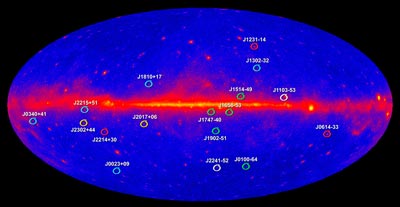搜索结果: 1-10 共查到“天体物理学 Pulsars”相关记录10条 . 查询时间(0.159 秒)
Pulsar electrodynamics has been built up by taking ingredients from two models, the vacuum-dipole model, which ignores the magnetosphere but includes the inductive electric field due to the obliquely ...
Assessing the Role of Spin Noise in the Precision Timing of Millisecond Pulsars
the Role of Spin Noise the Precision Timing
2011/1/10
We investigate rotational spin noise (referred to as timing noise) in non-accreting pulsars: millisecond pulsars, canonical pulsars, and magnetars. Particular attention is placed on quantifying the st...
An unified polar cap/striped wind model for pulsed radio and gamma-ray emission in pulsars
Pulsars general - Radiation mechanisms non-thermal - Gamma rays
2010/11/16
Thanks to the recent discovery by Fermi of about fifty new gamma-ray pulsars, it becomes possible to look for statistical properties of their pulsed high-energy emis-sion, especially their light-curve...
Fermi-LAT Search for Pulsar Wind Nebulae around gamma-ray Pulsars
catalogs – gamma rays observations – pulsars general
2010/11/12
The high sensitivity of the Fermi-LAT (Large Area Telescope) offers the first opportunity to study faint and extended GeV sources such as pulsar wind nebulae (PWNe). After one year of observation the ...
Thin accretion discs around millisecond X-ray pulsars
accretion accretion discs – magnetic fields – MHD –stars magnetic fields –stars
2010/11/15
Millisecond x-ray pulsars have weak magnetic dipole moments of ∼ 1016 Tm3 compared to ordinaryX-ray pulsars with dipolemoments of 1020 Tm3. For this reason a surrounding accretion
disc can exte...
Precise Gamma-Ray Timing and Radio Observations of 17 Fermi Gamma-Ray Pulsars
Gamma rays stars pulsars general Radio continuum stars X-rays: stars
2010/11/15
We present precise phase-connected pulse timing solutions for 16 gamma-ray-selected pulsars
recently discovered using the Large Area Telescope (LAT) on the Fermi Gamma-ray Space Telescope plus one ve...
Anomalous X-ray pulsars and soft gamma repeaters have recently emerged as a unified class of neutron stars, identified by dramatic X-ray and gamma-ray outbursts and via luminous X-ray pulsations, both...
Quantum Vacuum influence on the evolution of Pulsars
Solar and Stellar Astrophysics (astro-ph.SR) Quantum Physics (quant-ph)
2010/12/23
In this letter we show that Quantum Vacuum Friction (QVF) should play an important role in neutron star evolution. Taking into account this effect we show that magnetars could be understood as a natur...

By combining observations at gamma-ray and radio wavelengths, astronomers have rapidly increased the known number of millisecond pulsars in the Milky Way. The newly discovered pulsars, found using NAS...
Ultra-high-energy cosmic ray acceleration by magnetic reconnection in newborn pulsars
newborn pulsars cosmic ray magnetic reconnection
2009/6/4
Ultra-high-energy cosmic ray acceleration by magnetic reconnection in newborn pulsars。

